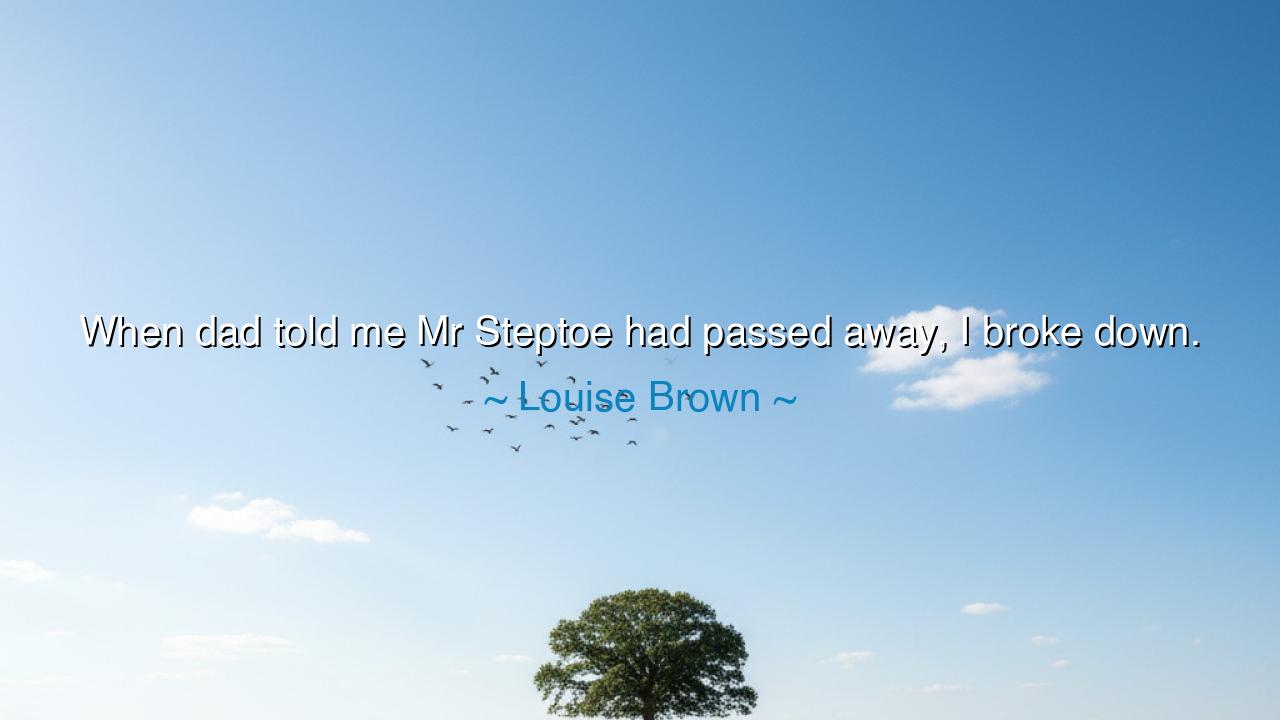
When dad told me Mr Steptoe had passed away, I broke down.





When Louise Brown said, “When dad told me Mr. Steptoe had passed away, I broke down,” her words carried the quiet weight of gratitude and grief intertwined. They were not merely the sorrowful remembrance of a man’s death, but the acknowledgment of a bond that transcended blood — a bond between creation and creator, between science and the soul it touched. In this single, tender line lies the voice of the first human being ever conceived through in-vitro fertilization — the first child born from what many once thought impossible. For Mr. Steptoe, Patrick Steptoe, was not her family by lineage, but the physician whose courage and brilliance brought her into the world. His passing, therefore, was not just the loss of a man, but the fading of a guiding star — one whose light had once pierced the darkness of despair for countless families longing for life.
The origin of this quote rests in one of the most extraordinary stories of the twentieth century. In 1978, Louise Brown was born in England, the first “test-tube baby” in human history. Her birth was the result of years of work by two pioneers: Patrick Steptoe, a gynecologist, and Robert Edwards, a physiologist and later Nobel laureate. Together, through experimentation and resilience, they forged a path into uncharted territory — proving that life could begin outside the human body, and then be nurtured to birth. For millions who faced infertility, their work was a miracle, and Louise was its living symbol. To the world, she was a headline; to Steptoe and Edwards, she was proof of hope. And to Louise herself, they were something deeper — the guardians of her existence, men who had risked ridicule to bring her into being.
When her father told her that Steptoe had died, Louise’s breakdown was not of mere sentimentality. It was the cry of a soul recognizing the loss of one who had helped to write her very story. For how does one mourn the death of the man who made one’s birth possible? It is the paradox of gratitude — that those who shape our destinies may not walk beside us for long, but their influence endures in every breath we take. Steptoe had not simply advanced medicine; he had rewritten the boundaries of human potential. To Louise, his death was not the end of a scientist’s life — it was the closing of a chapter in the human story of creation itself.
In ancient times, such figures were revered as demiurges, creators who bridged the gap between divine mystery and mortal endeavor. The Greeks would have compared Steptoe and Edwards to Prometheus, who stole fire from the gods to illuminate humankind. Like Prometheus, they suffered criticism and moral condemnation, for their work raised questions that reached into the realm of the sacred. But history proved that their flame was not theft, but gift — a fire that warmed rather than burned, that gave countless parents the chance to hold their own children. Louise’s grief, then, was not for the loss of fame or invention, but for the passing of one who had given light to so many.
Her words also remind us of the fragility of gratitude — how often we forget to honor those who make our existence possible. Not just the famous pioneers, but the quiet laborers, the mentors, the caregivers, the unseen hands whose actions shape the course of our lives. Louise’s sorrow can thus be heard as a call to remembrance: that we should not wait until death to acknowledge our debt of love. Each of us has our own “Mr. Steptoe” — someone whose presence or sacrifice brought us into fuller being. The wise remember them not with mere tears, but with action, by carrying their light forward.
Consider how human progress has always been built upon the courage of a few and the gratitude of the many. When Galileo looked to the heavens, when Curie sought the secrets of radiation, when pioneers dared to heal or to build — their works became seeds planted in generations unborn. And yet, too often, the world celebrates innovation without reverence for its human cost. Louise Brown’s grief restores that reverence. It reminds us that behind every discovery that changes the world, there is a heart that beats, a mortal hand that trembles, and a soul that dares to reach beyond its limits.
So, my child, take this truth to heart: honor those who gave you life — not only in body, but in spirit. Remember your parents, your teachers, your guides, and the visionaries who paved the way before you. Gratitude is the bridge between memory and immortality; it allows those who came before to live on in the deeds of those who follow. Like Louise, do not be ashamed to weep for them, for tears are the language of reverence. But let your mourning be fruitful: carry forward their courage, their curiosity, their compassion. For one day, you too will pass your own light into another’s hands — and that is how the human story continues, one heart at a time, from creator to creation, from teacher to child, from darkness to dawn.






AAdministratorAdministrator
Welcome, honored guests. Please leave a comment, we will respond soon